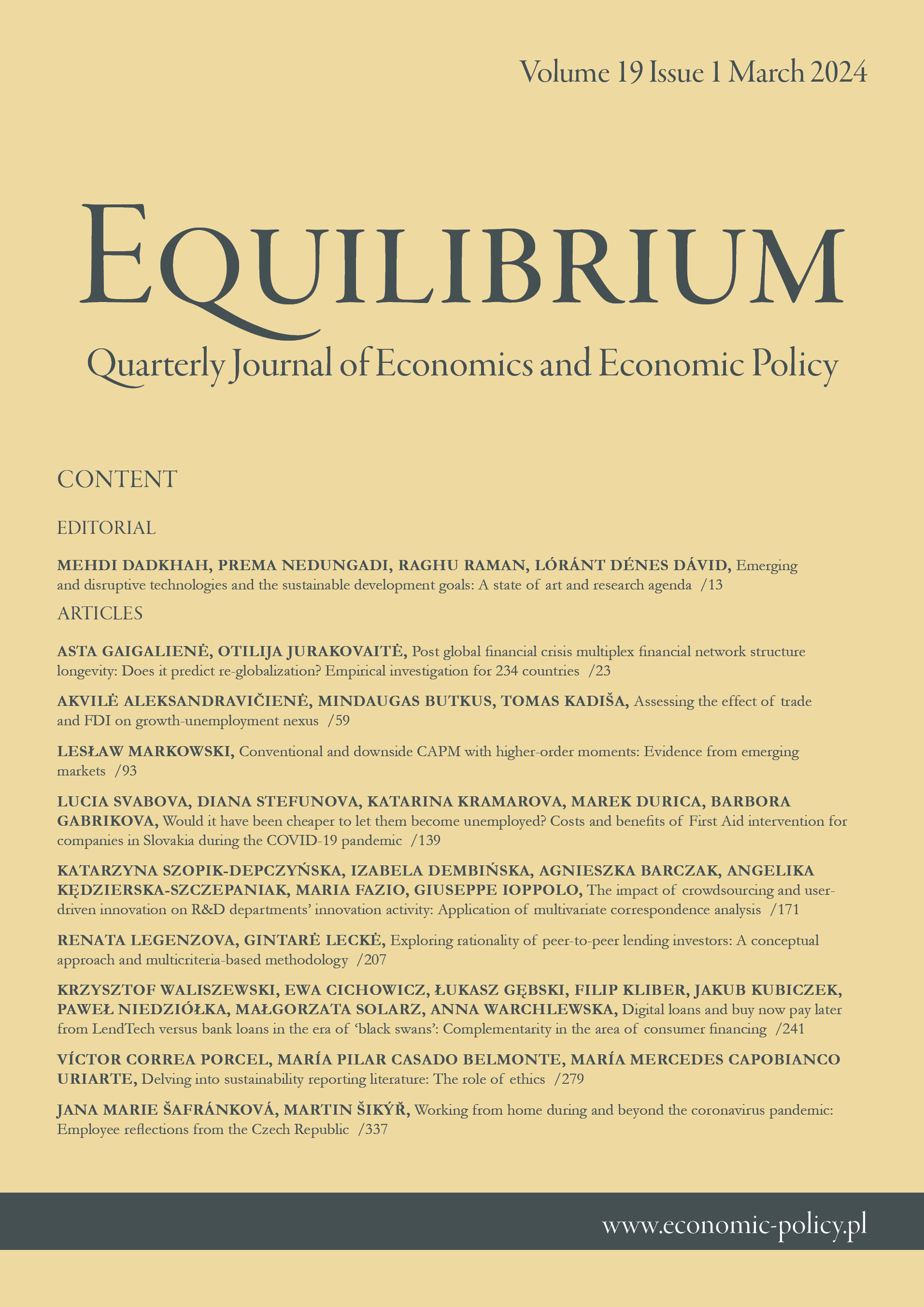根据国际财务报告准则编制财务报表时影响真实和公允观点的因素:来自捷克共和国的证据
IF 5
Q1 ECONOMICS
Equilibrium-Quarterly Journal of Economics and Economic Policy
Pub Date : 2020-09-07
DOI:10.24136/eq.2020.026
引用次数: 3
摘要
研究背景:会计记录为管理层的决策和公司的使用者提供了广泛的必要数据。美国财务报表。国际财务报告准则是被广泛接受的会计原则之一,经常与高质量财务报表的编制有关。文章的目的:本文的目的是确定在根据国际财务报告准则编制财务报表时导致错报发生的因素。接下来的目标是确定这种错报对财务报表使用者可能产生的影响。方法:研究本身侧重于在捷克共和国的国际财务报告准则应用感知问题。总共有193家捷克公司根据国际财务报告准则编制财务报表。描述性统计、独立性卡方检验和比例检验用于统计数据分析。发现与增值:结果表明,虽然会计错报并不经常发生,但在错报发生的频率和错报的平均规模之间可以显示出统计相关性。随后确定错报的频率也被证明是统计上依赖于错报的平均大小。国际财务报告准则本身并未被证明影响财务报表中的错报,这与以往的研究相反。与其他研究一样,本研究也证明了管理压力对会计信息质量的影响。本文扩大了关于影响根据国际财务报告准则编制的财务报表质量的因素的文献,同时得出了反驳实施国际财务报告准则经常被注意到的好处的结论。本文章由计算机程序翻译,如有差异,请以英文原文为准。
Factors influencing true and fair view when preparing financial statements under IFRS: evidence from the Czech Republic
Research background: Accounting records provide a wide range of data necessary for decisions of the management as well as for users of a company?s financial statements. IFRS represents one of the widely accepted accounting principles, often mentioned in relation to the preparation of high-quality financial statements.
Purpose of the article: The aim of this paper is to identify the factors contributing to the occurrence of misstatements when preparing financial statements under IFRS. The subsequent goal is to identify the possible influences of such misstatements on the users of the financial statements.
Methods: The research itself focuses on perceived problems in IFRS application in the Czech Republic. The total tested population is 193 Czech companies preparing their financial statements under IFRS. Descriptive statistics, the chi-square test of independence along with proportional tests, are used for the statistical data analysis.
Findings & Value added: The results indicate that, while misstatements in accounting do not occur regularly, a statistical dependence can be shown be-tween the frequency of misstatements occurrence and the average size of mis-statements. The frequency of the subsequently identified misstatements is also proven to be statistically dependent on the average size of misstatements. The IFRS themselves are not proven to influence misstatement occurrences in financial statements, which is in contrast with previous studies. Managerial pressures, similarly to other studies, are proven by the research to be affecting the quality of accounting information. This paper broadens the literature on the factors influencing the quality of financial statements prepared under IFRS and simultaneously reaches conclusions disproving the frequently noted bene-fits of IFRS implementation.
求助全文
通过发布文献求助,成功后即可免费获取论文全文。
去求助
来源期刊
CiteScore
9.20
自引率
3.50%
发文量
28
审稿时长
36 weeks
期刊介绍:
Equilibrium. Quarterly Journal of Economics and Economic Policy is a scientific journal dedicated to economics, which is the result of close cooperation between the Instytut Badań Gospodarczych/Institute of Economic Research (Poland) and Polish Economic Society and leading European universities. The journal constitutes a platform for exchange of views of the scientific community, as well as reflects the current status and trends of world science and economy.
The journal especially welcome empirical articles making use of quantitative methods in: Macroeconomics and Monetary Economics, International Economics, Financial Economics and Banking, Public Economics, Business Economics, Labor and Demographic Economics, Economic Development, and Technological Change, and Growth.
Current most preferable topics and special issues:
The economics of artificial intelligence: business potentials and risks;
Digitalization and entrepreneurship in economics;
Sustainable socio-economic development, environmental and ecological economics;
Transition in the energy market (improving energy efficiency, alternative energy sources, renewable energy, energy security).

 求助内容:
求助内容: 应助结果提醒方式:
应助结果提醒方式:


